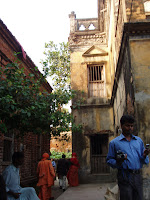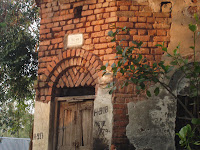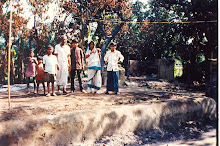Ulpur, Gopalganj (Faridpur) District, Bangladesh
by
Sabyasachi Ghosh Dastidar
This is my maternal home of 30+ generations of written history. Their home was in Ulpur village. My grandpa Dadu was Girindra Nath Roy Chowdhury and grandma Didima, Mrs. Nirada Sundari . He was lawyer practicing in Madaripur City, where he also built a boys' dorm. (When I interviewed Prof. Dr. Amalendu De https://www.youtube.com/watch?v=XoPiFEKQfSw and his wife Boudi [Sistee-in-law] Nasima Banu for ISPaD https://www.youtube.com/watch?v=FT_SX-y-rfs - see YouTube's ispad1947 channel – Prof De said he lived at my Dadu's hostel as a young man. Both were from Faridpur district. That was news to me. De-Banu had to flee to India after marriage in 1950s in Faridpur district of East Pakistan, now Bangladesh, for India as they came under attack.) Dadu was a political activist for India's independence struggle. He was awarded Rai Bahadur title by the British after WW I, but later Graandpa Dadu returned the award. In the end Dadu, Didima, MejoMama (Middle Maternal Uncle) and BarroMama (Older Maternal Uncle) spent 17 years in British oppressor's prison. Didima used to say “we just said Vande Mataram (Glory to the Motherland) and we were sent to jail." At times Didima and others were given singara and other food by jailers that they didn't consume. Once a jailer's wife brought then singara and jilebi/jeeleepee sweet by jailers wife saying "I am with you but not with the colonizing oppressors," that too the independence-fighting ladies didn't touch. One Mama Uncle passed his I.A., B. A., M.A., Journalism from behind the British bar. Attack on them after partition made them flee to a refugee hut in Naktala in South Kolkata. When I visited Ulpur first time in 2008 with my older sister Didi or Pratima, and a Hindu monk-guide from Madaripur, formerly a part of Faridpur District, now a separate district, a local Muslim man, a stranger, at the bus stop welcoming us said, "Go visit your home that we call '19 Judges' Home' or ‘unishta judger baari’ as there were 19 judges from that family during British Raj." Ma went to school in Faridpur/Madaripur, Dhaka and Barisal. In Madaripur City Probini Foundation of New York has built two boys hostel (dorm), and completing a third one, and a girls’ dorm in nearby Rajoir. Probini has also built a girls’ dorm at Turhamandra Sarajubala Girls’ School in Gopalganj, formerly a part of Faridpur District. https://empireslastcasualty.blogspot.com/2019/01/bangladeshgopalganj-tutamandra.html All are welcome to join and any help is appreciated. See www.Probini.org or www.ispad1947.org.
I believe Baba, Dad, Bhibhuti Bhusan, was a graduate of the first batch of Dacca (Dhaka) University. Ma, Nihar Kana, wanted to join Dacca but could not. She got the highest mark at Chatrabritti, while attending Donovan School of Madaripur City in 1910s of then Faridpur District receiving a gold medal in the name of a famous Hindu family that she gave to her grandson Shuvo and a congratulatory letter from British Governor General, both of which we kept at Partition Museum of New York City. She married as a teenager and after having 2 kids she went back to school receiving curses from many families, bur cheers from others. At the final exam she got highest mark in Bangla in the entire board receiving a silver medal that she gave to her grandson Raja. When she came to New York in 1986 in her 80s I tried to fulfill her dream of going to college by asking her to join our university. That didn’t happen. But now there is a community center called Nihar Kana Bhaktabash O Bidyaloi in Mahilara, Barisal, and a shrine in honor of her. See https://empireslastcasualty.blogspot.com/2019/06/sample-pictures-partition-documentation.html

 One of the Hindu Basu-Roy-Chowdhury Family Home; now Occupied by Others
One of the Hindu Basu-Roy-Chowdhury Family Home; now Occupied by Others Pond of Poplu (Basu) Roy-Chowdhury of Ulpur
Pond of Poplu (Basu) Roy-Chowdhury of Ulpur


Remains of Hindu Basu-Roy-Chowdnury Home; Family Fled to India












